Things to Know About Warrants and Job Background Checks
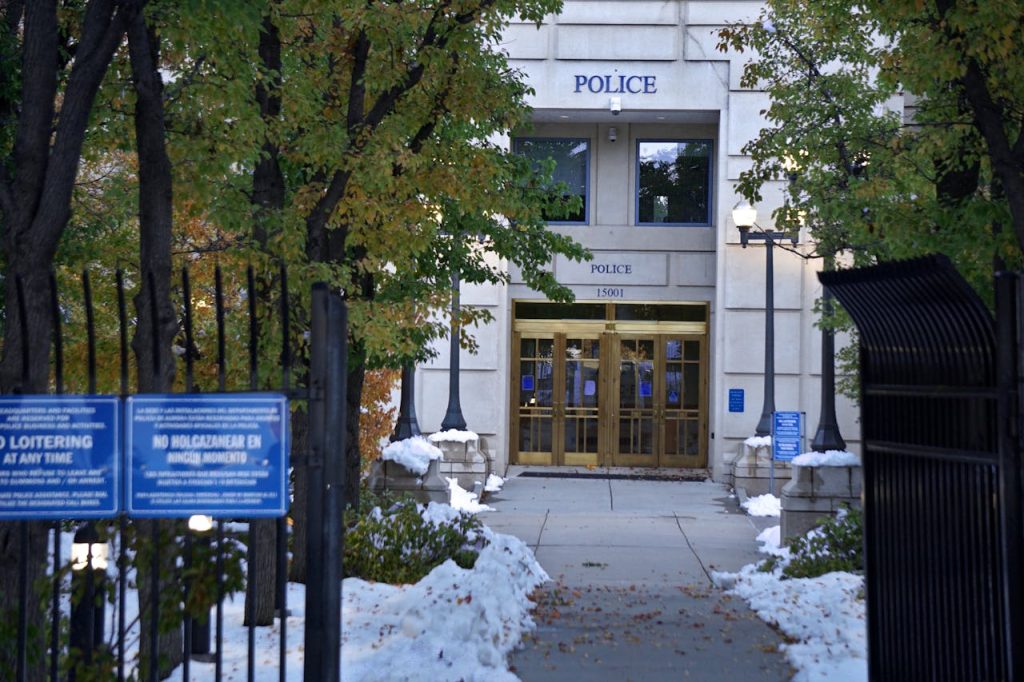
The Importance of Background Checks in Employment
Background checks have become a standard and essential part of the hiring process for businesses across all industries. Employers rely on these screenings to verify a candidate’s qualifications, assess their trustworthiness, and protect the workplace. This practice not only minimizes the risk of negligent hiring lawsuits but also ensures a safe and productive environment for employees and customers.
From verifying employment history to identifying potential red flags in a person’s criminal record, background checks provide a detailed view of a candidate’s past, helping employers make informed hiring decisions. For job seekers, understanding what these checks involve and how certain records, like warrants, might appear is essential for navigating the hiring process.
What Do Background Checks Typically Include?
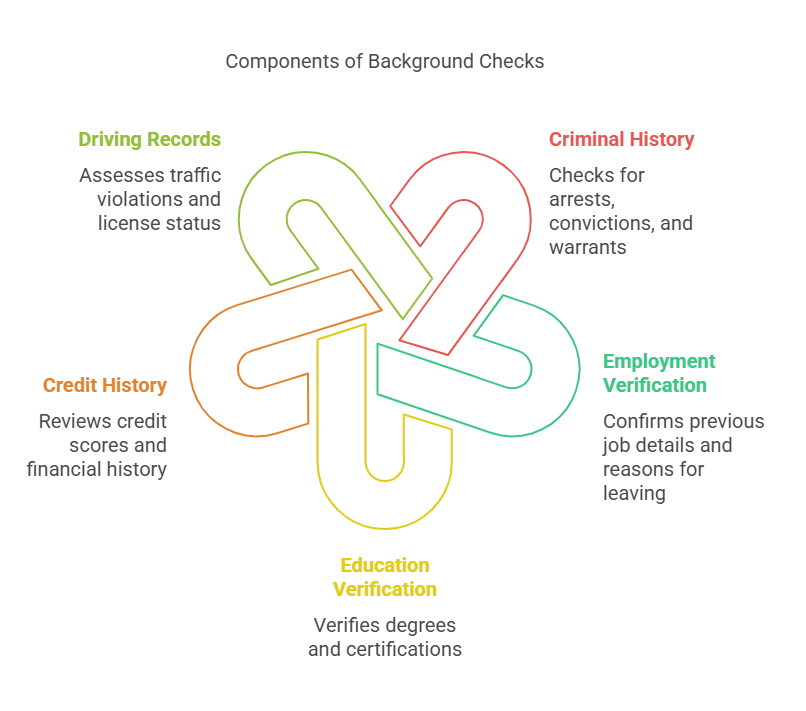
The scope of a background check depends on the employer, the industry, and the position. However, most checks include the following components:
- Criminal History: This is one of the most common components of a background check and may include arrests, convictions, warrants, and pending cases.
- Employment Verification: Employers verify previous job titles, dates of employment, and reasons for leaving to confirm the accuracy of the candidate’s resume.
- Education Verification: Degrees, certifications, and attendance at institutions are checked to ensure the candidate meets the educational requirements of the role.
- Credit History: Often required for roles involving financial management, this check includes information about credit scores, debt, and bankruptcies.
- Driving Records: This check is particularly relevant for positions that involve operating vehicles and includes traffic violations, DUIs, and license status.
Other checks may include drug screening, social media audits, and reference checks, depending on the employer’s policies and the specific role.
What Is a Warrant?
A warrant is a legal document issued by a judge or magistrate that grants law enforcement the authority to take a specific action. Warrants are generally tied to criminal cases or legal violations, and they are issued based on probable cause or failure to comply with legal obligations. The most common types of warrants include:
- Arrest Warrants: These are issued when there is sufficient evidence to suggest that an individual has committed a crime. Arrest warrants allow law enforcement to take the individual into custody.
- Bench Warrants: These are issued when someone fails to appear in court, comply with court orders, or pay fines. Bench warrants authorize law enforcement to arrest the individual and bring them to court.
- Search Warrants: These permit law enforcement to search a specified location for evidence related to a crime.
While search warrants typically do not impact employment background checks, arrest and bench warrants might, depending on the circumstances and the depth of the screening process.
Do Warrants Appear on Background Checks?
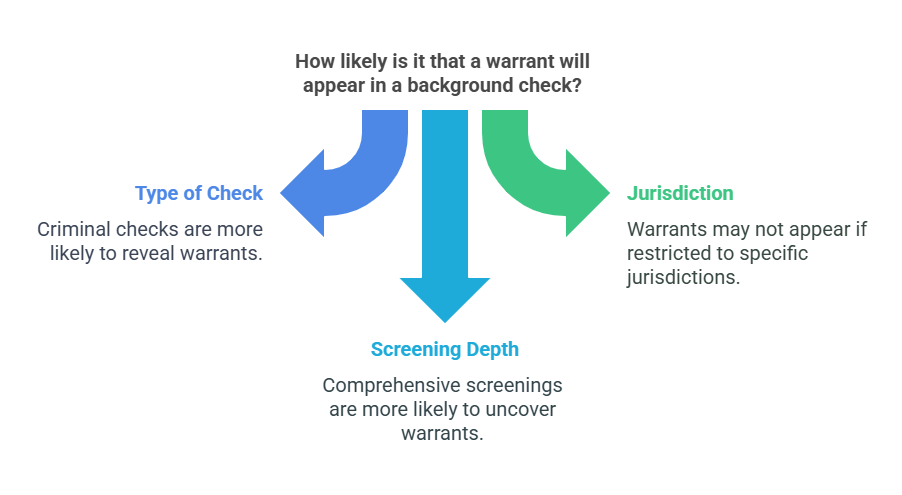
Whether a warrant appears on a background check depends on several factors, including the type of warrant, the nature of the background check, and the jurisdiction.
Type of Background Check
Warrants are most likely to show up in criminal background checks. Here’s how they may appear in different types of checks:
- Local and State-Level Criminal Checks: These often reveal warrants issued within the state or local jurisdiction.
- National Criminal Database Checks: Warrants entered into national databases (e.g., the National Crime Information Center) can show up, particularly for serious offenses.
- Federal Criminal Checks: Warrants related to federal crimes are more likely to appear in these screenings.
Jurisdictional Factors
Some warrants may not appear if they are restricted to specific jurisdictions or if the information has not been shared with larger databases. For instance, a bench warrant issued in one state might not be visible during a criminal background check conducted in another state.
Employer’s Screening Practices
The depth and scope of the background check are also critical. Employers who conduct more comprehensive screenings, often through third-party agencies, are more likely to uncover warrants. On the other hand, basic background checks may miss this information entirely.
Factors Determining Whether Warrants Appear on Background Checks
Several factors influence whether a warrant will show up during a background check. Understanding these nuances is vital for job seekers and employers alike.
1. Type of Background Check Conducted
The type of background check an employer performs plays a significant role in whether warrants are uncovered. Common types include:
- Local or State Criminal Background Checks: These typically reveal warrants issued within the same state or local jurisdiction.
- National Criminal Database Checks: Warrants recorded in national databases like the National Crime Information Center (NCIC) are more likely to appear here, particularly for serious or felony-level offenses.
- Federal Criminal Background Checks: Warrants for federal crimes will show up in this type of screening, which is common for roles in government or security-sensitive industries.
- Basic Employment Checks: Some employers opt for minimal checks, which may not include warrant-related searches unless explicitly requested.
2. Jurisdictional Limitations
Warrants are often tied to the jurisdiction in which they were issued. Local warrants may not appear in national databases unless they are reported to or shared with a broader network. For example:
- A bench warrant from a municipal court may only show up in that municipality’s records.
- Arrest warrants for serious crimes are more likely to be entered into national systems, making them visible across state lines.
3. State Laws and Reporting Regulations
Each state has specific laws regarding what can be included in background checks. For instance:
- Some states have laws limiting the reporting of older or minor offenses, including certain warrants.
- Other states may prohibit employers from considering certain types of warrants (e.g., warrants for unpaid parking tickets) during the hiring process.
4. Depth of Employer’s Screening Process
Employers who use third-party background check agencies often request comprehensive screenings. These agencies typically provide detailed reports that may include warrants. Conversely, smaller organizations conducting in-house checks may not have access to national databases, reducing the likelihood of discovering warrants.
Employment Implications of Warrants
Warrants can significantly impact employment prospects, depending on the employer’s policies, the type of warrant, and the nature of the job.
1. Employer Policies on Warrants
Each employer sets its own standards for evaluating candidates with warrants:
- Zero-Tolerance Employers: Some organizations, especially in industries like finance or healthcare, may automatically disqualify candidates with any active warrants.
- Case-by-Case Evaluation: Other employers might consider the severity of the warrant, its relevance to the job, and whether it has been resolved.
2. Nature of the Role
The impact of a warrant often depends on the responsibilities of the position:
- Positions of Trust: Jobs that involve handling sensitive information, money, or vulnerable populations (e.g., childcare, elder care) usually require a clean record.
- Government and Security Roles: Security clearance is often denied if a candidate has unresolved legal issues like warrants.
- Transportation and Logistics: A warrant related to driving offenses could disqualify a candidate for roles requiring a commercial driver’s license (CDL).
3. Severity and Status of the Warrant
Not all warrants carry equal weight in employment decisions. For instance:
- Active vs. Resolved Warrants: Employers may view an active arrest warrant more seriously than a bench warrant that has been resolved.
- Nature of the Offense: A warrant for a violent crime is far more likely to disqualify a candidate than one for a minor infraction, such as unpaid parking tickets.
Industry-Specific Considerations
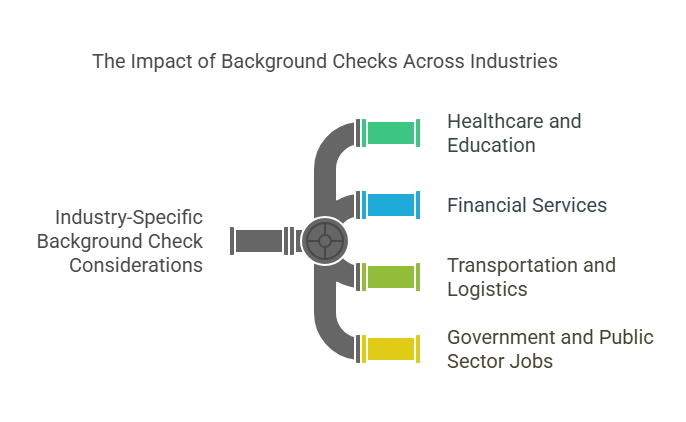
1. Healthcare and Education
In these fields, background checks are often more stringent due to the need to protect vulnerable populations. Warrants, even for minor offenses, can jeopardize a candidate’s eligibility.
2. Financial Services
Employers in banking and financial services often conduct in-depth screenings that include credit history and criminal checks. Warrants related to theft, fraud, or financial misconduct are particularly damaging.
3. Transportation and Logistics
Roles requiring a valid driver’s license or CDL often include driving record checks. Warrants related to DUIs or traffic violations may result in disqualification.
4. Government and Public Sector Jobs
Government roles often involve federal or state background checks, making it likely that any warrants—especially those related to criminal activity—will surface.
How Exact Background Checks Can Assist Employers
At Exact Background Checks, we specialize in helping employers make informed hiring decisions through comprehensive, reliable, and accurate background screening services. Our platform ensures:
- Thorough Record Analysis: We check criminal records, warrants, and other critical information across multiple databases.
- Compliance with Laws: We help employers navigate legal guidelines, including federal and state restrictions.
- Streamlined Hiring Process: Our reports are tailored to employers’ needs, simplifying the decision-making process.
By choosing Exact Background Checks, employers can confidently assess candidates while maintaining compliance and ensuring workplace safety.
Common Records in Background Checks: A Quick Reference Table
Below is a categorized list of records that may appear during background checks:
| Type of Screening | Records Included |
|---|---|
| Criminal History | Arrests, convictions, warrants, pending cases |
| Employment Verification | Job titles, dates, reasons for leaving |
| Credit Check | Credit score, debt, bankruptcies |
| Driving Records | Traffic violations, DUIs, license status |
| Education Verification | Degrees, certifications, attendance |
Employers can use this guide to determine which screenings align with their hiring requirements.
Legal Aspects of Background Checks in the U.S.
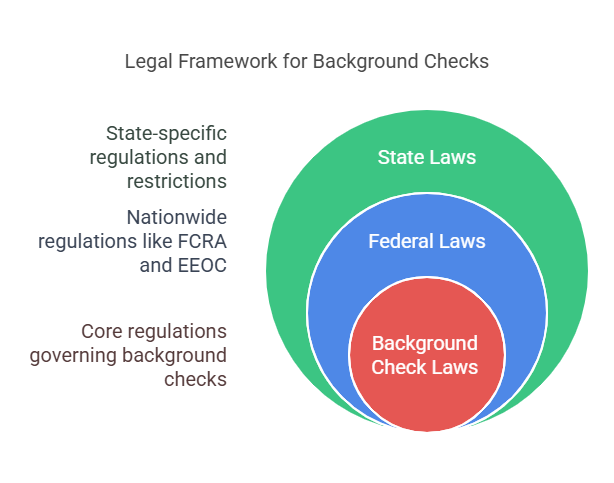
Employers must adhere to strict legal guidelines when conducting background checks, including federal and state-specific regulations. These laws are designed to protect job applicants from discrimination, ensure accurate reporting, and maintain privacy.
Federal Laws Governing Background Checks
- Fair Credit Reporting Act (FCRA)
The FCRA is the primary federal law regulating background checks. Key requirements include:
- Written Consent: Employers must obtain written permission from candidates before conducting a background check.
- Notification of Adverse Actions: If a candidate is denied employment due to information in a background report, the employer must provide a copy of the report and inform the candidate of their right to dispute inaccuracies.
- Accuracy Standards: Background check agencies are required to use reasonable procedures to ensure the accuracy of their reports.
- Equal Employment Opportunity Commission (EEOC) Guidelines
The EEOC prohibits discrimination in hiring practices. Employers must ensure that background check results are used in a way that does not disproportionately impact protected groups. For example:
- A blanket policy disqualifying all candidates with warrants could be considered discriminatory unless the policy is directly related to the job.
State-Specific Laws
Each state has unique laws governing what information can be included in background checks and how employers can use it. Common restrictions include:
- Ban-the-Box Laws: Many states and municipalities have implemented “ban-the-box” laws, which prevent employers from asking about criminal history (including warrants) on job applications.
- Time Limitations: Some states limit the reporting of criminal records, including warrants, to a specific time frame (e.g., 7 years).
- Relevance Requirements: In some jurisdictions, employers can only consider criminal records that are directly relevant to the job.
Employers must stay informed about the laws in their state to ensure compliance and avoid potential lawsuits.
FAQs About Warrants and Background Checks
What key components are typically included in an employment background check?
Employment background checks typically include:
- Criminal History: Arrests, convictions, warrants, pending cases.
- Employment Verification: Previous job titles, dates of employment, reasons for leaving.
- Education Verification: Degrees, certifications, attendance at institutions.
- Credit History: Credit scores, debt, bankruptcies.
- Driving Records: Traffic violations, DUIs, license status.
Do warrants appear on background checks, and what factors determine whether they do?
Yes, warrants can appear on background checks. Factors determining whether they do include:
- Type of Background Check: Local, state, national, or federal checks.
- Jurisdictional Factors: Whether the warrant is shared across databases.
- Employer's Screening Practices: Depth and scope of the check.
- State laws and reporting regulations.
What is the difference between an arrest warrant and a bench warrant, and how might they impact employment?
- Arrest Warrant: Issued when there's evidence of a crime, allowing law enforcement to take the individual into custody.
- Bench Warrant: Issued for failure to appear in court or comply with court orders.
Both can impact employment, especially in positions of trust or those requiring security clearances, but employers may consider the severity and status of the warrant.
What legal aspects govern background checks in the U.S., and what are the rights of job applicants?
Legal aspects include:
- Federal Laws: Fair Credit Reporting Act (FCRA) and EEOC guidelines.
- State-Specific Laws: Ban-the-box laws, time limitations, relevance requirements.
How do employers handle warrants in different industries, and what are some industry-specific considerations?
Employers handle warrants differently based on their policies and the nature of the job.
- Healthcare and Education: Stringent checks due to vulnerable populations.
- Financial Services: In-depth checks for financial misconduct.
- Transportation and Logistics: Checks for driving-related warrants.
- Government and Public Sector: Federal or state checks, likely to reveal warrants.
What key components are typically included in an employment background check?
Employment background checks typically include:
- Criminal History: Arrests, convictions, warrants, pending cases.
- Employment Verification: Previous job titles, dates of employment, reasons for leaving.
- Education Verification: Degrees, certifications, attendance at institutions.
- Credit History: Credit scores, debt, bankruptcies.
- Driving Records: Traffic violations, DUIs, license status.
Do warrants appear on background checks, and what factors determine whether they do?
Yes, warrants can appear on background checks. Factors determining whether they do include:
- Type of Background Check: Local, state, national, or federal checks.
- Jurisdictional Factors: Whether the warrant is shared across databases.
- Employer's Screening Practices: Depth and scope of the check.
- State laws and reporting regulations.
What is the difference between an arrest warrant and a bench warrant, and how might they impact employment?
- Arrest Warrant: Issued when there's evidence of a crime, allowing law enforcement to take the individual into custody.
- Bench Warrant: Issued for failure to appear in court or comply with court orders.
Both can impact employment, especially in positions of trust or those requiring security clearances, but employers may consider the severity and status of the warrant.
What legal aspects govern background checks in the U.S., and what are the rights of job applicants?
Legal aspects include:
- Federal Laws: Fair Credit Reporting Act (FCRA) and EEOC guidelines.
- State-Specific Laws: Ban-the-box laws, time limitations, relevance requirements.
How do employers handle warrants in different industries, and what are some industry-specific considerations?
Employers handle warrants differently based on their policies and the nature of the job.
- Healthcare and Education: Stringent checks due to vulnerable populations.
- Financial Services: In-depth checks for financial misconduct.
- Transportation and Logistics: Checks for driving-related warrants.
- Government and Public Sector: Federal or state checks, likely to reveal warrants.
Conclusion
Background checks are a vital part of the hiring process, providing employers with critical insights into a candidate’s history. Warrants, depending on their type, jurisdiction, and relevance, can appear on these checks and impact employment prospects.
Understanding the legal framework surrounding background checks is essential for both employers and job seekers. Compliance with laws such as the FCRA and EEOC guidelines ensures that hiring decisions are fair and accurate, while candidates benefit from protections against discrimination and reporting errors.
Employers looking to simplify and enhance their hiring process can turn to professional services like Exact Background Checks. With our comprehensive screening solutions, employers gain access to accurate, up-to-date information while maintaining compliance with all legal requirements.
By prioritizing transparency and diligence in the hiring process, employers can create a trustworthy and secure workplace while giving qualified candidates the opportunity to succeed.



